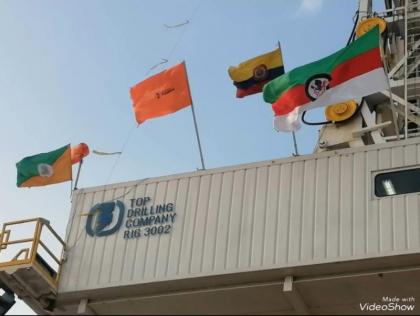From Coordinador Nacional Agrario, january 22nd 2024

Peasant communities, community action committees and other social sectors in Colombia's central-eastern region held a day of protest against Canadian oil company Parex Resources. They demanded that the company pay its debts to the territory. The mobilization is taking place at all the oil company's wells in Arauca.
“The reason we're doing this day has to do with several things: firstly, the transnational companies, which are plundering resources here, have not had the will to repair the social, humanitarian and environmental rift they've created in this part of the country. Secondly, the government has shown no sign of willingness to make the social investments that communities in this part of the country need, due to the historical neglect to which they have been subjected,” says Ernesto Roa, spokesman for the communities.
Parex Resources, which arrived in Colombia in 2009, has been denounced for being responsible for environmental disasters such as the drought that caused the death of over 20,000 capybaras in Casanare in 2015. In 2021, Parex becomes the independent company with the most acreage in Colombia, acquiring 18 new blocks in the Colombian tender and expanding its strategic partnership with Ecopetrol S.A. by acquiring 50% stakes in the Arauca and LLA-38 blocks.

Last week, Ecopetrol and Parex announced the discovery of an oil and gas deposit in an exploration well called Arauca-8, located in the department of Arauca. The Canadian company explained that the well was drilled to a total depth of 21,010 feet as a pioneering excavation, where initial tests led to the discovery of a source of around 9 million cubic feet of natural gas per day and over 1,000 barrels of oil per day.
“We've been carrying out mobilization days since 1972. If you look at the demands, the needs are the same, except they've been updated over time,” explains Roa. “Companies are in a bidding war over their contributions. Parex claims to have invested nearly 500 billion pesos in the region. These investments made so far are called 'work for taxes'. What does this mean? That the money they have invested in the Arauca is not part of what they have to provide as social responsibility to mitigate the impacts of their presence, but rather it is tax money that comes back to us, Colombians.”
It should be remembered that Parex was one of the companies responsible for developing the pro-fracking lobby in Colombia and one of the three companies that received the first deposits for possible exploration of this extraction technique (in the Magdalena Medio) in 2012.
Joana Pinzón, spokesperson for the day of protest, concludes: “The list of demands for this day synthesizes all the demands of the communities and all the sectors that make up the Movimiento Político de Masas Social y Popular del Centro Oriente Colombiano. The list includes issues relating to the environment, territory, mining and energy, productivity (processing plants, projects, land), education, health, drinking water, basic sanitation and housing. There is also a specific focus on indigenous and Afro issues. Everything is condensed into a single list because, ultimately, these are demands to improve living conditions in the department of Arauca, because there has been a historical abandonment of the region and there is a social debt owed to the department's communities.”
Original version of the article (in spanish) : https://www.colombiainforma.info/ante-incumplimientos-arauca-realiza-jornada-de-exigencias-a-la-petrolera-canadiense-parex/?fbclid=IwAR0eJOcI2_sPTMpsyNHKO0HxFvMahr6XAsIWubhLrV_WOWZg5tUTdj-1dAk